Thunderbolt Restoration Part 1
Restoration of Thunderbolt choppers and horns, and one of these days, a rotator box
Notice: Throughout this restoration section, you can click on any photo to see it at a much larger size. It will
pop open in a new window with javascript, and right-click "open page in a new window" won't work. No photos may
be taken from this site and used without my permission.
Thunderbolt parts trickle in...
During January and February, I received parts of various Thunderbolt sirens from various sources. First came the horn and chopper of a 1000T
from Sherman Texas (pictured right), which turned out to have been robbed of its original dual-tone rotor and fit with a single-tone one (argh!). Next I got a 1000
chopper, chopper housing, horn and horn bracket from Ed Wise at www.sirens-for-cities.org.
This 1000 chopper, oddly enough, had a Model 2T rotor installed to make it effectively a dual-tone siren. Lastly, I received the chopper and
solenoids of a 1003 removed from Warren, IL.
|
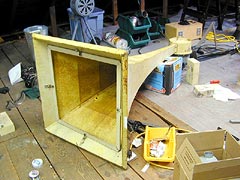
|
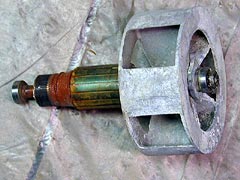
|
This is the hideous single-tone rotor that arrived
in this 1000T. Perhaps the siren's original dual-tone rotor failed, but more likely it was
"junkyard swapped" after removal from service. The dual-tone 6/5 rotors are not as easy to come
by as the single-tone rotor, which is still made and can be purchased new.
|
|
This next shot is for those of you who always wondered about how big these things are. The answer is: bigger than
they look from the ground but small enough to fit up my attic stairs :-D The horn is 52" x 27.75" and yours truly
is 69.5" tall. While you're looking at this photo and thinking how unfortunate-looking I am, let me distract you with
this question: how many other sirens can you I.D. in this picture?
|

|
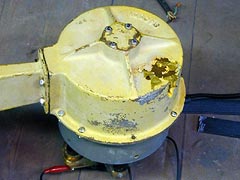
|
Next is a close-up of the chopper assembly. As many of you know, the Tbolt chopper is nothing more than a slightly modified
Model 2 siren. The differences are the stator and the extra pair of brushes for the rotating power connection. The stator cap on
the chopper is not aluminum as on the Model 2, it's actually a fairly hefty chunk of brass or bronze. The patch
where the paint looks melted away is where I have just tested the Citrustrip paint stripper spray.
|
|
Here is a shot of the chopper's field coils and motor frame. Any Model 2
owner will recognize these as Model 2 parts, which they are.
|
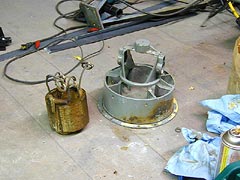
|
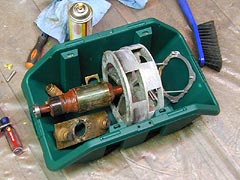
|
Here is a shot of my "parts bucket" containing the rest of the 1000T chopper. I use these bins to keep all the little bits and
fasteners together. This shot shows a 2T rotor in the bucket, since this is what I will be rebuilding the 1000T with. The single-tone
rotor that came in my 1000T is going into the 1000 chopper I got from sirens-for-cities.
holes.
|
|
One of the first things I noticed when the horn arrived was the crusty rubber gasket stuck to the end. It was pretty well stuck to
the horn, very dirty and warped. In the photo at the left is the original gasket (far left) and the replacement I made from fresh new red
gasket rubber I found in the Home Depot plumbing aisle. The original gasket has 4 extra holes in it, near the corners.
These are for accomodating the 4 extra bolts found on a 1003 that attach the solenoids to the stator. Since this replacement gasket
is going on my 1000T stator, I did not need to duplicate these
|
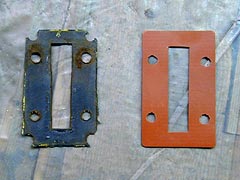
|
Proceed to Page 2 --->
Adam Smith ©2002






